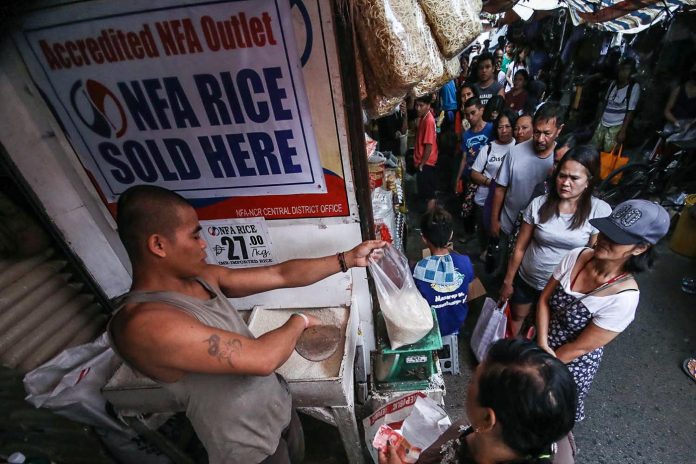
MANILA – Agriculture secretary Emmanuel “Manny” Piñol has bared some salient improvements in the draft Implementing Rules and Regulations (IRR) on the Rice Tariffication Law.
In a chance interview with the media, Piñol said among the salient improvements in the draft IRR, which was approved on Tuesday by the National Food Authority (NFA) Council, was the concept of a “Rolling Buffer Stocking” where the NFA whose main task is now buffer stocking will buy local farmers’ produce all-year round with an optimal level of buffer stocks good for 30 days.
“The Rolling Buffer Stocking system means as soon as it reaches 30 days buffer stock, the NFA will continue to buy palay from local farmers,” he said.
The Rolling Buffer Stocking system will allow the NFA to roll over its procurement funds and continuously buy local rice thus protecting the farmers from a feared drop in the buying price, he added.
The DA chief clarified that the NFA will continue to sell rice because of the Rolling Buffer Stocking concept as it will have to clear its warehouses of old stocks to prevent spoilage.
“This means that stocks in excess of the 30-day buffer will be released to the market on a ‘First-In, First-Out’ system,” he said.
While Republic Act 11203, or The Rice Tariffication Law says NFA could only release its buffer stocks during emergencies, Piñol said the IRR opened a new interpretation which would now allow NFA to dispose of old stocks.
This means that the imported rice recently acquired by the NFA will be released to the organized grains retailers to be sold at P27 per kilo.
Piñol said the imported stocks would last until the end of August, after which the local rice stocks bought from the farmers will be milled and released to the market.
“The initial batch bought by the NFA will be released to the market. Since there remain stocks of cheap imported rice, the price will remain at PHP27 per kilo. Now, since locally grown rice was purchased at a higher price, we will eventually have to recompute the selling price. But the NFA isn’t after profit, rather it is out to perform its mandate of assuring sufficient buffer stock during calamities. So, while there will be adjustment, that has yet to be determined in future NFA Council meetings,” he said in Filipino.
“The computation will be based on the procurement price,” he added.
Aside from the P17 per kilo price of palay the NFA will buy from the farmers, cooperatives and association, an addition of P3.40 per kilo per farmer, and P3.70 per kilo per farmer cooperatives/associations will be given. Total amount to be received when they sell their produce to NFA will be P20.40 a kilo for individual farmer and P20.70 for farmers’ associations/cooperatives.
“In addition, we will also implement additional incentive which will start next harvest season na bawat benta ng magsasaka sa NFA ay bibigyan namin sila ng libreng abono (for every sale farmers make to the NFA, they will get free fertilizer as added incentive),” the DA chief said.
Another feature of the IRR was the removal of the requirements on “Collaterals” in the PHP1-billion Credit Facility under the Rice Competitiveness Enhancement Fund (RCEF).
Interest rate for the RCEF Credit Program is pegged at one-third of the prevailing Bangko Sentral rates.
The new IRR also emphasized that the machinery and farm equipment and seeds will be given to the rice farmers as grants.
Farmers associations will have the priority over local government units in the distribution of the farm machinery and equipment.
It was also agreed during the NFA Council meeting yesterday that there would be transitory arrangements in the transfer of NFA’s regulatory and food safety functions while Import Permits issued by the NFA under the Out-Quota arrangement will be valid until all of the stocks are brought into the country.
Piñol said displaced NFA employees may be transferred to other agencies under the DA especially the Bureau of Plant Industry (BPI) as the food safety function is new to the agency.
“Obviously, BPI cannot handle this new mandate. It’s something new to the bureau and it isn’t prepared,” he said.
“I may ask the President (Rodrigo Duterte) to consider and allow the DA to open up new positions to accommodate the displaced employees,” he said.
A special safeguard duty on rice will also be imposed to protect the rice industry from sudden or extreme price fluctuations.
A safeguard duty is a temporary increase in import duty of an agricultural product to deal with import surges or price falls, under the World Trade Agreement (WTO) on Agriculture.
Besides, Piñol said, it is the mandate of the Department of Trade and Industry to implement the Price Act, which will stabilize the prices of rice in the market since the NFA has no more regulatory powers. (PNA)







